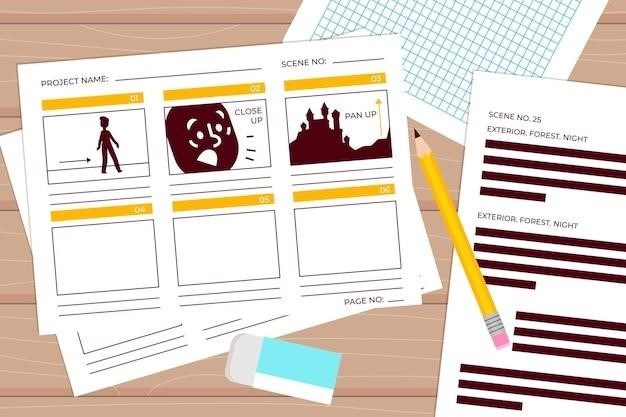McCarthyism CommonLit Answer Key PDF⁚ A Comprehensive Guide
This guide offers a thorough exploration of McCarthyism, utilizing CommonLit resources․ It provides context, key figures, and strategies for analyzing CommonLit texts related to this pivotal period in American history․ Expect detailed analysis and resources for effective study and comprehension․ Explore primary sources and connect McCarthyism to modern political discourse․
Understanding the Historical Context of McCarthyism

McCarthyism, a period in American history marked by intense anti-communist paranoia, emerged from the post-World War II atmosphere of the Cold War․ The Soviet Union’s expansionist policies and the development of nuclear weapons fueled widespread fear of communist infiltration within the United States․ This fear wasn’t unfounded; the Soviet Union did engage in espionage, and the real threat of communist influence played a significant role in shaping public opinion․ However, Senator Joseph McCarthy’s exploitation of this fear created a climate of suspicion and accusations that often disregarded due process and individual rights․ The context is crucial to understanding the era’s excesses and its lasting impact on American society and political discourse․ The widespread fear of communism allowed McCarthy to manipulate public opinion and political processes, leading to unjust investigations and the blacklisting of individuals suspected of communist sympathies․ Understanding this historical context is essential to critically evaluating the events and their consequences․
The Rise of Senator Joseph McCarthy and His Accusations
Senator Joseph McCarthy’s ascent to prominence was inextricably linked to the prevailing anti-communist sentiment of the early 1950s․ He skillfully exploited public anxieties, leveraging vague accusations and unsubstantiated claims to garner attention and political power․ His infamous speeches, filled with dramatic pronouncements about communist infiltration in the government and military, captivated audiences and fueled the flames of fear․ McCarthy’s tactics often involved naming individuals as suspected communists without providing concrete evidence, relying on innuendo and intimidation․ These reckless accusations ruined reputations and careers, chilling free speech and creating a climate of intense paranoia․ His methods, while effective in gaining short-term political advantage, ultimately undermined democratic principles and contributed to a significant erosion of trust in government institutions․ The lack of due process and the disregard for individual rights became hallmarks of the McCarthy era, leaving a lasting legacy of caution regarding unsubstantiated accusations and the dangers of unchecked political power․
The Impact of the Cold War on American Society
The Cold War profoundly shaped American society, fostering a climate of fear and suspicion that permeated daily life․ The constant threat of communist expansion fueled intense patriotism and a deep-seated anti-communist sentiment․ This pervasive anxiety manifested in various ways, from loyalty oaths and security clearances to the widespread practice of blacklisting individuals suspected of communist sympathies․ Educational institutions, workplaces, and even social circles were not immune to the chilling effect of McCarthyism․ Individual freedoms were curtailed as citizens hesitated to express dissenting opinions for fear of reprisal․ The entertainment industry, for example, underwent a period of self-censorship, with writers, actors, and directors facing career-ending consequences for perceived left-leaning views․ This pervasive atmosphere of fear and suspicion stifled intellectual discourse and created a climate of conformity, significantly impacting artistic expression and political debate․ The legacy of this period continues to resonate, reminding us of the fragility of civil liberties during times of national insecurity and the importance of safeguarding individual rights even amidst perceived threats․
Key Figures and Events in the McCarthy Era
Senator Joseph McCarthy, the namesake of the era, stands as a central figure, his unsubstantiated accusations fueling the Red Scare․ His relentless pursuit of suspected communists, often based on flimsy evidence or outright fabrications, led to numerous investigations and ruined careers․ The Hollywood Ten, a group of screenwriters and directors who refused to cooperate with the House Un-American Activities Committee (HUAC), faced blacklisting and imprisonment, symbolizing the era’s suppression of free speech․ The Army-McCarthy hearings, televised nationally, exposed McCarthy’s bullying tactics and ultimately led to his censure by the Senate․ Alger Hiss, a high-ranking State Department official, was accused of espionage and convicted of perjury, highlighting the paranoia surrounding infiltration of the government․ Julius and Ethel Rosenberg, executed for conspiracy to commit espionage, remain a controversial case, with ongoing debates about the extent of their guilt․ These figures and events epitomize the excesses and injustices of McCarthyism, leaving a lasting impact on American political and social life․ The era’s legacy serves as a cautionary tale about the dangers of unchecked power and the importance of due process․
CommonLit’s Role in Teaching about McCarthyism
CommonLit plays a crucial role in educating students about McCarthyism by providing access to primary and secondary source materials related to the era․ Their platform offers curated texts, including excerpts from speeches, investigative reports, and personal accounts, allowing students to engage with diverse perspectives on the events․ CommonLit’s resources facilitate a deeper understanding of the historical context, the impact on individuals and society, and the lasting legacy of McCarthyism․ The platform’s structured approach, including comprehension questions and discussion prompts, encourages critical thinking and analysis of the sources․ By providing a range of materials, CommonLit enables educators to construct engaging lessons that explore the complexities of McCarthyism, fostering informed discussions about the dangers of political extremism, the importance of civil liberties, and the responsibility of citizens in a democracy․ The platform’s accessibility makes these vital historical lessons available to a broader audience, promoting a more comprehensive understanding of this significant chapter in American history․
Analyzing CommonLit’s McCarthyism Text
Effectively analyzing CommonLit’s McCarthyism texts requires a multi-faceted approach․ Begin by identifying the author’s main argument or purpose․ Consider the historical context surrounding the text’s creation—the height of the Cold War and the pervasive fear of communist infiltration․ Pay close attention to the author’s tone and word choice; is it accusatory, fearful, or analytical? Analyze the evidence presented; is it credible and unbiased? Identify any potential biases or perspectives that might shape the author’s narrative․ Compare and contrast different texts on CommonLit dealing with McCarthyism to gain a more comprehensive understanding of the multifaceted nature of the events․ Look for recurring themes⁚ the erosion of civil liberties, the power of public opinion, and the consequences of unchecked accusations․ By carefully examining these aspects, students can develop a nuanced interpretation of the events and their significance in shaping American history and political discourse․ Remember to support your analysis with direct textual evidence, quoting relevant passages and explaining their significance within the larger context․
Identifying Key Themes in the CommonLit Material
CommonLit’s resources on McCarthyism offer rich opportunities to explore several key themes․ One prominent theme is the erosion of civil liberties․ The fear of communism led to the violation of individual rights, as seen in the unfair accusations and investigations․ Another central theme is the power of public opinion and mass hysteria․ The widespread fear fueled by McCarthy’s accusations created a climate where due process was often disregarded․ The abuse of power is another significant theme, highlighting how unchecked authority can lead to injustice․ Senator McCarthy’s actions exemplify how political ambition and fear can corrupt the democratic process; The impact of the Cold War on American society is a pervasive theme, showing how external conflicts could severely impact domestic life and liberties․ Furthermore, the dangers of unsubstantiated accusations and the importance of critical thinking are highlighted, reminding readers to question information and demand evidence before accepting claims as truth․ Analyzing these interconnected themes deepens understanding of this turbulent period and its lasting legacy on American politics and society․ Consider how these themes resonate in contemporary political discourse․
Strategies for Answering CommonLit Questions
Utilizing Online Resources for Further Research

The internet provides a wealth of resources to enhance your understanding of McCarthyism beyond the CommonLit materials․ Reputable historical websites, such as those affiliated with universities or government archives, offer primary source documents like Senate hearing transcripts and personal accounts from the era․ These firsthand accounts provide invaluable insights into the atmosphere and impact of McCarthy’s actions․ Academic databases, accessible through many libraries, contain scholarly articles providing diverse perspectives and analyses of McCarthyism’s causes, consequences, and legacy․ Be discerning when selecting online sources; prioritize those from credible institutions with established reputations for accuracy․ Wikipedia, while useful for initial overviews, should be supplemented with more authoritative sources for detailed research․ Utilize online encyclopedias and digital archives to access biographies of key figures such as Senator Joseph McCarthy, key witnesses, and victims of the accusations․ These resources help develop a more nuanced understanding of the individuals involved and their motivations․ Remember to always critically evaluate the information you find online, considering the author’s background, potential biases, and the overall credibility of the source before incorporating it into your research or analysis․ Effective use of online resources can significantly enrich your understanding of this complex historical period․
Finding McCarthyism-Related Quiz Materials
Numerous online platforms offer quizzes and assessments focused on McCarthyism, providing valuable tools for self-testing and reinforcing your understanding of the subject matter․ Educational websites, such as Quizizz and Kahoot!, often feature user-created quizzes on historical topics, including McCarthyism․ These interactive quizzes typically offer a range of question types, from multiple-choice to true/false, and provide immediate feedback on your answers․ Searching for “McCarthyism quiz” or “Cold War quiz” on these platforms will yield a variety of options, allowing you to select quizzes tailored to your specific learning needs and level of understanding․ Remember to evaluate the source and quality of the quizzes; look for those with clear, accurate information and well-constructed questions․ Many educational websites offer printable worksheets and quizzes, providing a tangible resource for offline study․ These materials often include a mix of factual recall questions and more analytical prompts, encouraging a deeper engagement with the subject․ By utilizing diverse quiz formats, you can strengthen your knowledge retention and identify areas where further study is needed․ Remember to use these quizzes as a learning tool, not just a means of achieving a high score․ Focus on understanding the concepts tested, not just memorizing answers․
Accessing Study Guides and Flashcards
Supplementing your CommonLit studies with readily available study guides and flashcards can significantly enhance your comprehension of McCarthyism․ Numerous websites and educational platforms offer pre-made study guides covering key figures, events, and themes related to this historical period․ These guides often provide concise summaries of complex topics, making them ideal for review and quick reference․ Many online resources also offer downloadable flashcards focusing on key terms, individuals, and events associated with McCarthyism․ These flashcards can be a highly effective tool for memorization, particularly when used in conjunction with spaced repetition techniques․ Consider creating your own flashcards if you find existing resources insufficient․ This active learning approach can improve knowledge retention․ Platforms like Quizlet allow you to create and share digital flashcards, making collaboration and knowledge sharing easier․ Remember to prioritize quality when selecting study guides and flashcards․ Look for resources that accurately represent historical events and interpretations, avoiding biased or inaccurate information․ By incorporating these resources into your study plan, you’ll build a strong foundation in your understanding of McCarthyism and prepare effectively for any assessments or further studies․
Examining Primary Source Documents from the Era
Delving into primary source documents from the McCarthy era offers unparalleled insight into the period’s atmosphere and complexities․ These firsthand accounts – including speeches, letters, newspaper articles, and government documents – provide a richer understanding than secondary interpretations alone․ Accessing these materials can be achieved through various online archives and libraries, many of which provide digitized versions of historical records; The Library of Congress, for instance, holds an extensive collection of materials relating to the Cold War and McCarthyism․ Analyzing primary sources requires careful consideration of the author’s perspective and potential biases․ Consider the author’s background, intended audience, and the historical context in which the document was created․ Comparing and contrasting multiple primary sources can further enhance your understanding, revealing different viewpoints and interpretations of the same events․ Pay attention to language used, the tone of the writing, and any underlying assumptions or agendas․ By critically examining these documents, you move beyond the simplified narratives often found in textbooks, gaining a more nuanced perspective on the complexities of McCarthyism and its impact on American society․ This immersive approach cultivates a deeper understanding than passively receiving information, fostering a more informed and critical perspective on history․ Remember to always cross-reference information found in primary sources with secondary analysis to ensure a balanced understanding․
Connecting McCarthyism to Modern Political Discourse
Understanding the McCarthy era’s relevance to contemporary political discourse requires a careful examination of recurring themes․ The fear-mongering tactics employed during McCarthyism, fueled by anxieties about communism, find parallels in modern political rhetoric surrounding issues like terrorism and immigration․ The erosion of civil liberties and due process, hallmarks of the McCarthy era, resonate with contemporary debates about government surveillance and the balance between national security and individual freedoms․ The use of accusations and unsubstantiated claims to discredit political opponents remains a troubling parallel․ Analyzing historical instances of McCarthyism helps us identify and critique similar strategies in modern political landscapes․ The weaponization of fear and the suppression of dissent are recurring patterns, highlighting the importance of critical thinking and media literacy․ By recognizing these historical parallels, we can better understand and resist attempts to manipulate public opinion and undermine democratic principles․ Studying McCarthyism equips us to identify and challenge contemporary instances of political scapegoating and the erosion of civil liberties, promoting a more informed and engaged citizenry committed to protecting democratic values in the face of similar threats․ The lessons learned from this pivotal period in American history serve as a powerful reminder of the fragility of democratic institutions and the constant need for vigilance against those who would exploit fear and division for political gain․
